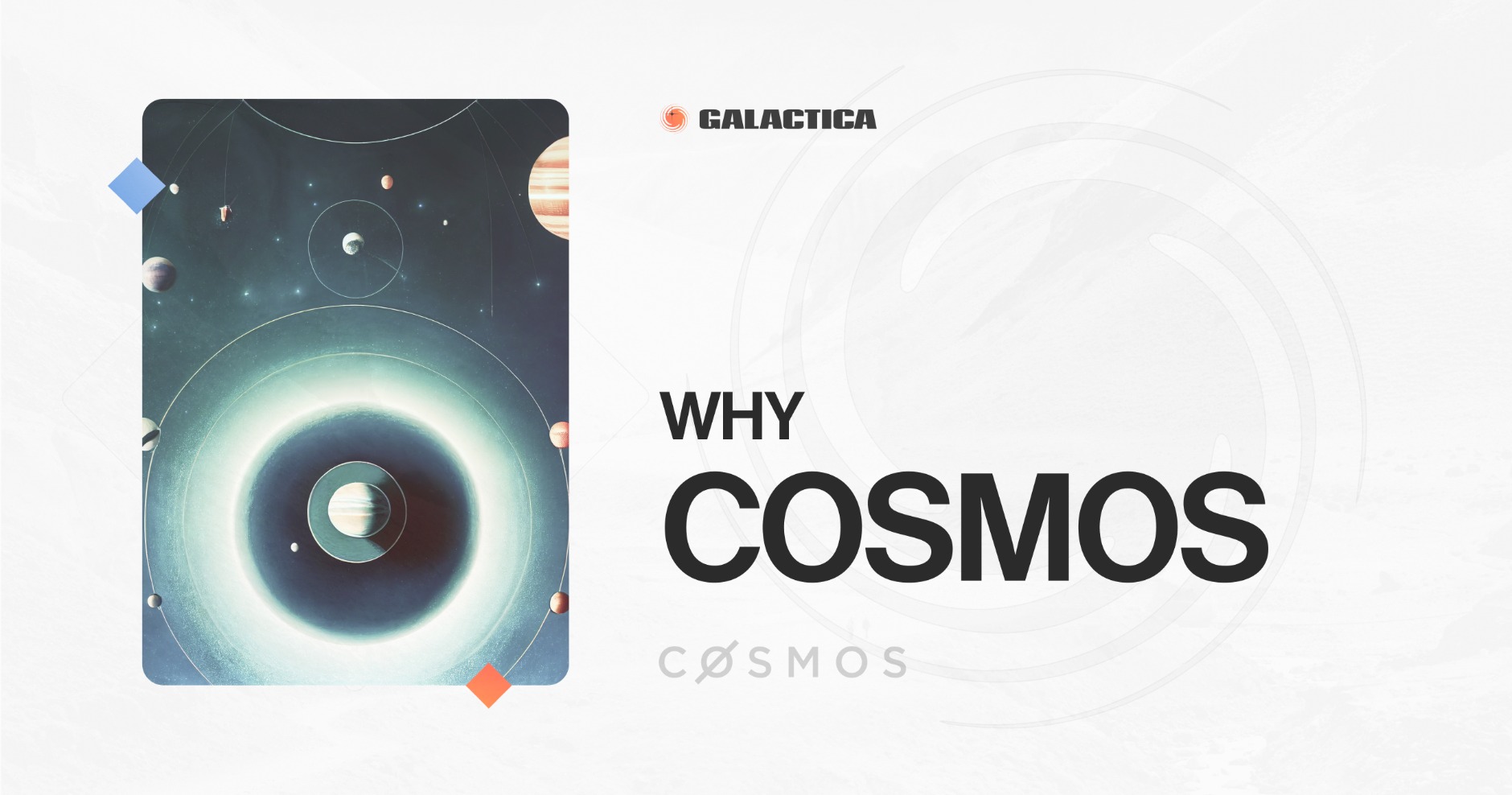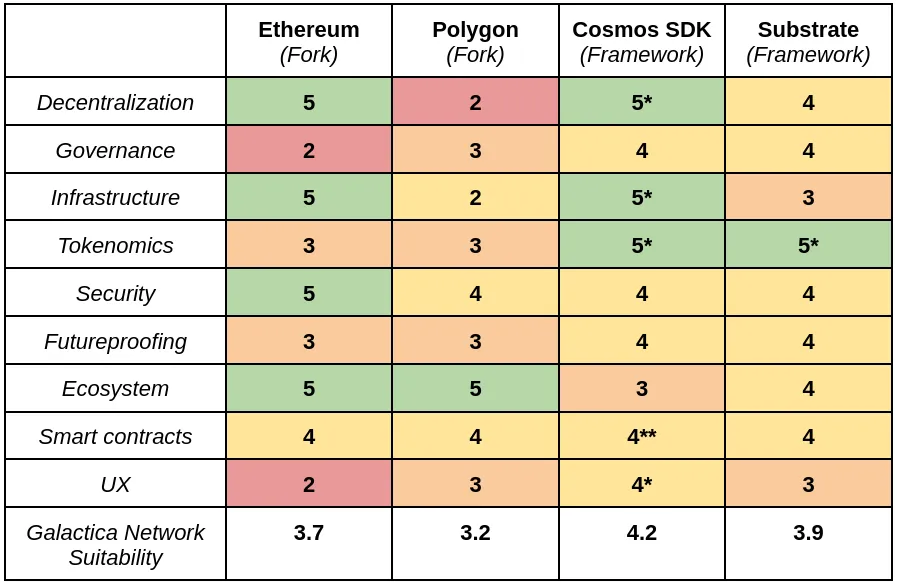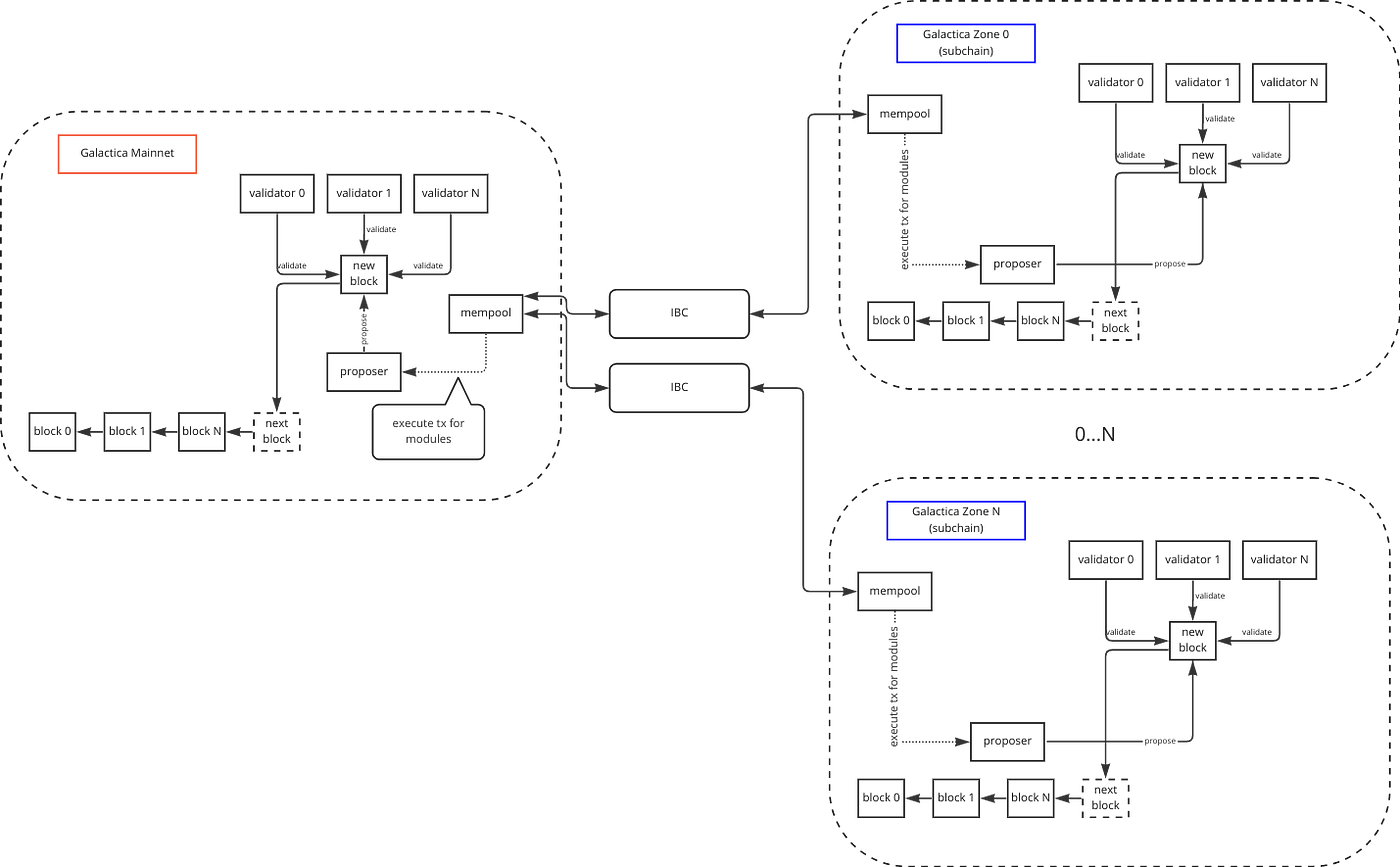

Galactica Network: Why Cosmos?
The Cosmos SDK proved an excellent choice for Galactica Network, providing the necessary scalability and finality properties while also meeting the requirements for building our reputation, privacy, and compliance features. All of this, in addition to endless possibilities for combination with other modules and integration with other chains have facilitated the choice of using Cosmos SDK as the base to build Galactica Network on.

The foundations of Galactica Network
During the development of Galactica Network, it has been crucial to consider the desirable characteristics of a blockchain when determining the substrate on which we built such an ambitious protocol. These characteristics enable us to form a foundation for hosting a meritocratic decentralized society and providing compliant-privacy on-chain.
With the need for such unique features, this decision was essential to the functionality and future-proofing required by the network. We compared the most promising platforms to aid the decision-making process and weighed them for suitability using metrics specific to Galactica Network's needs.
After deep consideration, we ended up with several platforms on our shortlist, which included:
Our internal research and the debates that followed were suitably robust - comparing the minutiae of each platform in detail to inform our decision. Ultimately, we chose the Cosmos SDK as the base upon which to build Galactica Network for its synergy with our unique technology stack, reliable consensus mechanism, modular architecture, and EVM compatibility.
To provide some context into our decision-making process, we will now dive into the many factors we considered when building Galactica Network.
Filtering candidates - the shortlist
The success of any protocol relies on the underlying technology that makes up its foundations. In the case of Galactica Network, and its entirely unique requirements, its foundations' importance can not be understated. With so many platforms available on the market, it was a daunting task to filter the array of quality options available and select the one that best fitted the specific needs of the Galactica Network.
To aid in this process, we compiled a shortlist of platforms that might have been capable of supporting our innovative feature set. The table below is a simplified dataset derived from several of our internal research documents. Our research spanned the key features and benefits applicable to Galactica Network for each target platform and was utilized to make the most informed decision possible.

Figure 1, Summary of shortlisted candidates in the context of suitability for Galactica Network
Denotes a field in which Galactica Network's implementation within the framework determines its strength.
** Score supported via the presence of EVMOS' EVM module
Please note: Dozens of platforms were initially considered, encompassing the entire spectrum of the crypto space. Galactica Network, with its unique compliant-privacy and reputational features, has highly specific requirements which are reflected in our suitability ratings. Our shortlist is by no means an exhaustive ranking of the general merits of these protocols.
While this table gives us a good overview, in the following sections we would like to provide you with a more detailed understanding of our requirements, processes, and ultimately our decision to build upon the Cosmos SDK.
What makes a good Blockchain?
The first question we had to ask ourselves was, 'What properties do we want Galactica Network to have?' as its answer would considerably impact how we built the protocol.
Firstly and most importantly, Galactica Network must be decentralized and permissionless - this is critical to our mission and the success of blockchains in general. This decentralization must remain intact in conjunction with security robust enough to withstand failures and attacks from malicious actors.
Beyond these basic requirements, there were many essential metrics to consider when determining the scope of Galactica Network, some of which we will summarize here from a document penned by our engineers at the protocol's inception.
Governance
Decisions should be made via community consensus, with experts' involvement to present the pros and cons of each option. When considering the fundamental structure of any substrate we might have built upon; governance was one of our most important considerations due to the presence of zkID-centric voting that was to be available on Galactica Network.
Infrastructure
We require a large set of validators, geographically diverse hosting, and independent operators. It is essential to avoid centralization by not having all validators on a single cloud provider, such as AWS. Instead, we prioritize open-source, transparent, and community-driven systems.
Tokenomics
Wealth must be spread among many parties, with fair distribution, and limited supply.
Security
We prioritize security with a secure code base for the consensus algorithm, nodes, smart contract language, peer-to-peer networking, and wallets. Code will be audited and formally verified, and based on sound cryptography principles - it will also be resistant to Sybil, denial of service, and brute force attacks.
Upgradability
We require systems that allow us to evolve the technology to improve scalability, features, etc. We also prioritize being fork-resistant, preventing the network from being split by incompatible upgrades.
Developers
Maintaining and incentivizing a solid developer community is crucial for a successful blockchain, with a strong core team working on improvements and a broad base of developers able to deploy products. We also prioritize an ecosystem that offers various products and possibilities to use the chain for different purposes.
Smart contracts
Contracts should support a Turing-complete language to be expressive enough for use by all application types, be compatible with existing applications, and efficiently support zero-knowledge primitives.
Scalability
We need to support a high number of transactions per second, with on-chain data storage and sufficient support for complex applications.
Tooling
Provision of extensive documentation is needed, in addition to an informative block explorer, node interfaces, IDE integration, and educational resources.
UX
Galactica Network must feature fast settlement, low transaction costs, 100% uptime, and support for as many wallets as possible. We also prioritize privacy and enabling compliant, private transactions on-chain.
During the development process, we considered the above characteristics and other metrics to create a list of requirements for any base layer we may decide to build on. By considering these factors, we can build a robust and secure platform that not only provides the features needed to build a true 'CypherState' on-chain, but also fosters innovation and drives adoption.
All roads lead to Cosmos
After much consideration, we chose the Cosmos SDK as the secure, scalable, and modular basis for Galactica Network. There are several reasons for this, but broadly Cosmos SDK provided the feature set most capable of supporting the reputationally-enhanced, compliant, and private transactions we wanted to make available to users.
The Cosmos SDK provides an excellent system for building blockchains, offering the reliable Tendermint consensus mechanism and proven modules such as staking, governance, and banking. Additionally, the architectural framework of the Cosmos SDK makes it easy to add custom modules, allowing us to integrate compliant privacy, and the reputation features unique to our protocol.
Compared to forking Ethereum or using Polygon PoS, the Cosmos SDK is more feasible for us to develop and maintain, ensuring the rapid implementation of fixes and features determined via Galactica Network's governance processes. The Cosmos SDK also has a strong developer base and utilizes the Go programming language, which is modern and fast.
The Cosmos SDK's modularity, multi-chain model, and IBC protocol are the fundamental components that put the framework ahead of the competition in the context of building a protocol such as Galactica Network.
A notable example that utilizes the SDK's multi-chain components effectively is Galactica Network's reputational framework. The Cosmos SDK allows us to efficiently bridge and communicate across chains, enabling scalability for our reputation system; essentially allowing us to outsource the potentially heavy computational work required for reputation calculations to specialized sub-chains.

Figure 2, Galactica Network Mainnet and reputation sub-chain interactions
You can learn more about our implementation of reputation on-chain by reading Galactica Network's Reputation Design Implementation paper, or the simplified version available on our Medium blog.
Beyond reputation, the Cosmos SDK's modularity enables us to take full advantage of the 'hooks' available via the EVMOS module, which assist us in our implementation of Contingent Transactions involving ERC20 tokens. The EVMOS module also allows us to tap into existing tools and infrastructure in the Ethereum ecosystem, and gain derived support from hardware wallets and Metamask.
Finally, the flexibility inherent to the Cosmos SDK allows us to consider future features that might greatly increase interchain utility, such as allowing other protocols to leverage reputation data from Galactica Network to inform social-capital transactions on their own networks.
Our conclusions
Galactica Network's unique value proposition comes from its combination of a viable reputation framework, and the ability to deliver compliant-privacy on-chain.
The Cosmos SDK's modular design enables us to create specialized chains that allow this unique combination to exist concisely and efficiently. Through IBC, we can leverage our zero-knowledge compliance and reputation features with liquidity from other chains, creating synergies to build a robust ecosystem.
Overall, the Cosmos SDK proved an excellent choice for Galactica Network, providing the necessary scalability and finality properties while also meeting the requirements for building our reputation, privacy, and compliance features. All of this, in addition to endless possibilities for combination with other modules and integration with other chains.
Afterword
While we have been quietly developing Galactica Network, we have been cognisant of the need to become an active part of the Cosmos ecosystem, and during this time, we have gained the attention of several of the community's most prolific natives. One of our earliest friends and supporters, Cosmos HOSS, had this to say regarding Galactica Network's decision to build on the Cosmos SDK:
'The bottom line is there needs to be a blockchain that leverages interoperability while being fully regulatory compliant for all citizens to feel safe, secure and at ease to participate in a truly decentralized economy.
Galactica Network utilizing Cosmos and IBC offers that' - Cosmos HOSS






